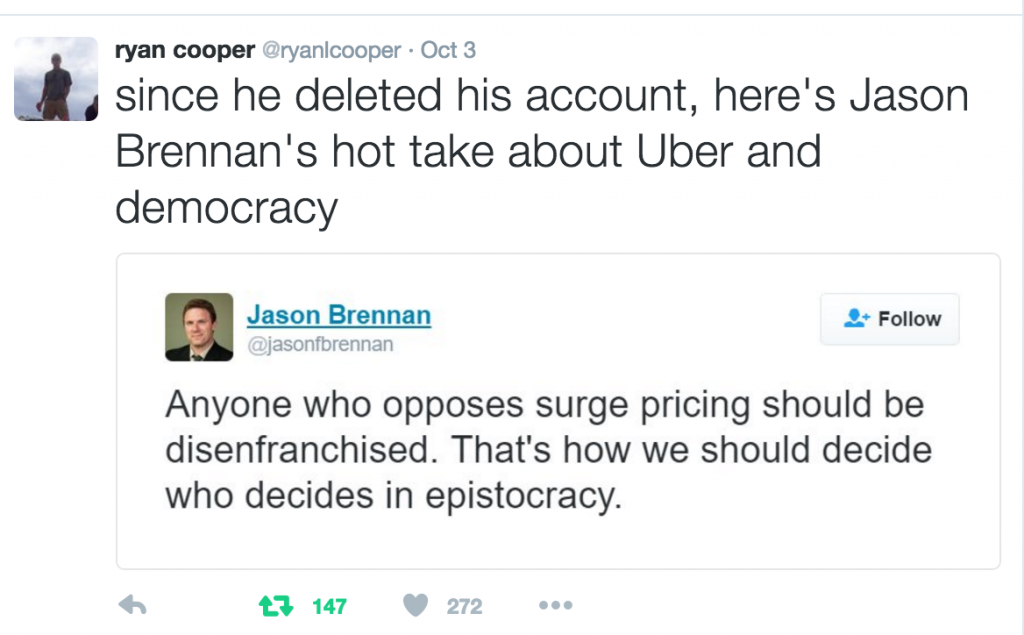There are many theories of Trump out there – here’s another – Trump as Renaissance princeling. The New York Times:
As a parade of job seekers, TV talking heads and statesmen like Henry Kissinger paraded through the lobby of Trump Tower this past week, Mr. Trump ran his presidential transition from his triplex on the 58th floor much the way he ran his campaign and his business before that — schmoozing, rewarding loyalty, fomenting infighting among advisers and moving confidently forward through a series of fits and starts. … Yet Mr. Trump loves the tension and drama of a selection process, and has sought to stoke it. A senior adviser described the meeting, in part, as Mr. Romney simply coming to pay his respects to the president-elect and “kiss his ring.” … Mr. Trump also likes to surprise, and enjoys the worldwide speculation he sets off with his Twitter posts.
This reminds me weirdly of Padgett and Ansell’s description of how Cosimo de Medici used ‘robust action’ and constructive ambiguity about his ultimate goals to manipulate those around him.
We use the term “robust action” to refer to Cosimo’s style of control. The key to understanding Cosimo’s sphinxlike character … is multivocality – the fact that single actions can be interpreted coherently from multiple perspectives simultaneously, the fact that single actions can be moves in many games at once, and the fact that public and private motivations cannot be parsed. … The “only” point of this, from the perspective of ego, is flexible opportunism – maintaining discretionary options across unforseeable futures in the face of hostile attempts by others to narrow those options.
Crucial for maintaining discretion is not to pursue any specific goals. For in nasty strategic games, like Florence or like chess, positional play is the maneuvering of opponents into the forced clarification of their (but not your) tactical lines of action. Locked in commitment to lines of action, and thence to goals, is the product not of individual choice but at least as much of thers’ successful “ecological control” over you. Victory, in Florence, in chess, or in go means locking in others, but not yourself, to goal-oriented sequences of strategic play that become predictable thereby.
The crucial difference being of course, that Cosimo de Medici rarely spoke in public and Donald Trump, via Twitter feed, via softball interviews, and via any medium that isn’t going to present him with unfriendly and harsh questions does nothing else but talk.
However, multivocality can plausibly take a variety of different forms. The Renaissance form is to adopt a strategy of ‘whatever you say, say nothing,’ leaving it for others to interpret your ambiguous actions as they will, forcing them to commit while you remain unbounded. Another is to talk constantly, but not to allow what you say to be constrained by consistency, or logic, or anything other than the short term desire to badfoot your opponents in short term tactical games and the long term one to make everyone pay attention to you, and condition their actions on you, without you having to condition their actions on them. The two have somewhat similar long term consequences. In each, the successful practitioner dominates the public space and public argument as everyone tries to interpret what the hell you have done, paying attention to you and no-one else but you, so that you can continue to play center stage in the theater of politics while everyone else is reduced to Waldorf and Statler, carping from the critics’ box.
If this is right, the key qualities of presidential politics over the next four years will be instability, frequent policy change, palace intrigues, and Trump looking to reign triumphant above it all, not particularly caring (a la Padgett and Ansell’s Cosimo) about attaining specific goals, but instead looking to preserve his position at the center of an ever shifting spider web of political relations, no matter what consequences this has for the integrity of the web. This might not be authoritarianism in the sense of a well-honed bureaucratic regime dedicated to horrible ends, but authoritarianism in terms of the general break down of Weberian order and hierarchies in favor of a largely personalized politics in which one’s relationship with an erratic and unpredictable president counts for far more than one’s formal position and authority (of course, all politics do depend on personal relations more than one might like, but bureaucracy and rules still usually count).

